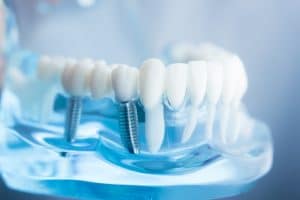 The greatest thing about dental implants isn’t that they’re relatively new compared to other prosthesis. It’s that they do something that others can’t – replace your lost teeth roots. For patients in Encinitas/San Diego who’ve experienced tooth loss, dental implants can do significantly more for their smiles than conventional bridges and dentures, especially when it comes to the long-term health and integrity of their smiles. (more…)
The greatest thing about dental implants isn’t that they’re relatively new compared to other prosthesis. It’s that they do something that others can’t – replace your lost teeth roots. For patients in Encinitas/San Diego who’ve experienced tooth loss, dental implants can do significantly more for their smiles than conventional bridges and dentures, especially when it comes to the long-term health and integrity of their smiles. (more…)
Can Periodontal Disease Really Be a Health Risk?
 Periodontal disease, which develops in the gum tissues that surround your teeth roots, is the leading cause of adult tooth loss. In its severe form, periodontitis, the disease destroys your gum tissues and jawbone structure, leaving one or more teeth without the support they need. However, this is only one reason why periodontal disease is such a threat. For patients in Encinitas/San Diego who don’t treat their conditions as soon as possible, severe periodontitis can also lead to increased risks of other chronic health conditions. (more…)
Periodontal disease, which develops in the gum tissues that surround your teeth roots, is the leading cause of adult tooth loss. In its severe form, periodontitis, the disease destroys your gum tissues and jawbone structure, leaving one or more teeth without the support they need. However, this is only one reason why periodontal disease is such a threat. For patients in Encinitas/San Diego who don’t treat their conditions as soon as possible, severe periodontitis can also lead to increased risks of other chronic health conditions. (more…)
What Does Periodontal Treatment Consist Of?
 Some forms of dental treatment, like routine checkups and cleanings, are necessary for everyone. Without them, you’d be at a much higher risk of developing a dental disease or allowing a minor issue to grow into a much more serious one. Other treatments, however, are recommended and designed according to need, such as specialized periodontal treatment. For patients in Encinitas/San Diego who experience periodontal (gum) disease, periodontal treatment can be customized according to their unique periodontal needs and preferences. (more…)
Some forms of dental treatment, like routine checkups and cleanings, are necessary for everyone. Without them, you’d be at a much higher risk of developing a dental disease or allowing a minor issue to grow into a much more serious one. Other treatments, however, are recommended and designed according to need, such as specialized periodontal treatment. For patients in Encinitas/San Diego who experience periodontal (gum) disease, periodontal treatment can be customized according to their unique periodontal needs and preferences. (more…)
The Potential Lifelong Consequences of Gum Disease
 Gum disease, or periodontal disease, is a significant concern for a majority of adults in Encinitas/San Diego. Not only can it lead to uncomfortable symptoms such as gum tissue inflammation and bleeding, but also cause patients to lose teeth, experience further oral health troubles, and have higher risks of certain systemic illnesses. Therefore, one of the most important reasons to seek expert periodontal treatment is to minimize or avoid the potential lifelong consequences of gum disease. (more…)
Gum disease, or periodontal disease, is a significant concern for a majority of adults in Encinitas/San Diego. Not only can it lead to uncomfortable symptoms such as gum tissue inflammation and bleeding, but also cause patients to lose teeth, experience further oral health troubles, and have higher risks of certain systemic illnesses. Therefore, one of the most important reasons to seek expert periodontal treatment is to minimize or avoid the potential lifelong consequences of gum disease. (more…)
3 Ways Dental Implants Outperform Other Prostheses
 After experiencing tooth loss, patients in Encinitas/San Diego have several different options for rebuilding their smiles. For instance, dental bridges can replace one or a couple of adjacent lost teeth. Meanwhile, partial and complete dentures can replace several lost teeth or all of the teeth on an upper or lower dental ridge. For many patients, however, dental implants outperform other options in several important ways. (more…)
After experiencing tooth loss, patients in Encinitas/San Diego have several different options for rebuilding their smiles. For instance, dental bridges can replace one or a couple of adjacent lost teeth. Meanwhile, partial and complete dentures can replace several lost teeth or all of the teeth on an upper or lower dental ridge. For many patients, however, dental implants outperform other options in several important ways. (more…)
A Holistic Approach to Healing Your Gums
 Periodontal disease isn’t just common, it’s also a serious threat to every facet of your oral health if it’s allowed to develop. The extensive damage it could cause to your gums, periodontal ligaments, and jawbone structure can lead to serious conditions including tooth loss. Fortunately, patients in Encinitas/San Diego have a variety of options for restoring their healthy gums, many of which include holistic periodontal treatments that boost your gums’ natural ability to fight off disease and heal. (more…)
Periodontal disease isn’t just common, it’s also a serious threat to every facet of your oral health if it’s allowed to develop. The extensive damage it could cause to your gums, periodontal ligaments, and jawbone structure can lead to serious conditions including tooth loss. Fortunately, patients in Encinitas/San Diego have a variety of options for restoring their healthy gums, many of which include holistic periodontal treatments that boost your gums’ natural ability to fight off disease and heal. (more…)
3 Things Every Tooth Loss Patient Should Know
 The worrisome thing about tooth loss is that it can affect virtually anyone, and for a wide variety of reasons. However, the good thing is that, even if you fail to prevent it, you can still prevent the potentially devastating consequences of tooth loss with the right dental prosthesis. For patients in Encinitas/San Diego, that prosthesis is often a dental implant-supported restoration, which replaces every portion of your lost tooth, including its root. (more…)
The worrisome thing about tooth loss is that it can affect virtually anyone, and for a wide variety of reasons. However, the good thing is that, even if you fail to prevent it, you can still prevent the potentially devastating consequences of tooth loss with the right dental prosthesis. For patients in Encinitas/San Diego, that prosthesis is often a dental implant-supported restoration, which replaces every portion of your lost tooth, including its root. (more…)
The Oral Bacteria Responsible for Gum Disease
 Of the many different chronic oral health conditions that you may have to worry about, periodontal disease (or gum disease) is one of the most prominent ones. It’s also one of the more destructive, leading to high rates of adult tooth loss and increased risks of several other severe health conditions. Patients in Encinitas/San Diego who develop the disease can often experience a wide range of issues, much of which stem from the inflammation caused by a specific, harmful type of oral bacteria – Porphyromonas gingivalis. In fact, that inflammation can also pose a risk to more than just your oral health if it isn’t addressed as soon as possible. (more…)
Of the many different chronic oral health conditions that you may have to worry about, periodontal disease (or gum disease) is one of the most prominent ones. It’s also one of the more destructive, leading to high rates of adult tooth loss and increased risks of several other severe health conditions. Patients in Encinitas/San Diego who develop the disease can often experience a wide range of issues, much of which stem from the inflammation caused by a specific, harmful type of oral bacteria – Porphyromonas gingivalis. In fact, that inflammation can also pose a risk to more than just your oral health if it isn’t addressed as soon as possible. (more…)
Why Your Periodontist Worries About Bad Breath
 There are many things that your dentist or periodontist may worry about that you aren’t aware of. For example, if you have consistently bad breath and have tried multiple home remedies to rid yourself of it, then it’s likely a symptom of something much more serious, such as periodontal disease. For patients in Encinitas/San Diego, the presence of chronic bad breath could be just the beginning of a serious threat to their smiles. If ignored, the issue causing it will continue to grow increasingly worse. (more…)
There are many things that your dentist or periodontist may worry about that you aren’t aware of. For example, if you have consistently bad breath and have tried multiple home remedies to rid yourself of it, then it’s likely a symptom of something much more serious, such as periodontal disease. For patients in Encinitas/San Diego, the presence of chronic bad breath could be just the beginning of a serious threat to their smiles. If ignored, the issue causing it will continue to grow increasingly worse. (more…)
Wondering if You Have Gum Disease? Here Are the Signs
 Sometimes, certain signs and symptoms can make oral health conditions obvious. For example, if your gums are significantly eroded and your teeth have become loose, then the presence of gum disease may seem obvious. However, when it first develops, gum disease isn’t that obvious, and many patients in Encinitas/San Diego can miss the signs that first warn them of the condition. If you’re wondering if you have gum disease, then check closely for these signs that could mean it’s time to visit your periodontist. (more…)
Sometimes, certain signs and symptoms can make oral health conditions obvious. For example, if your gums are significantly eroded and your teeth have become loose, then the presence of gum disease may seem obvious. However, when it first develops, gum disease isn’t that obvious, and many patients in Encinitas/San Diego can miss the signs that first warn them of the condition. If you’re wondering if you have gum disease, then check closely for these signs that could mean it’s time to visit your periodontist. (more…)



